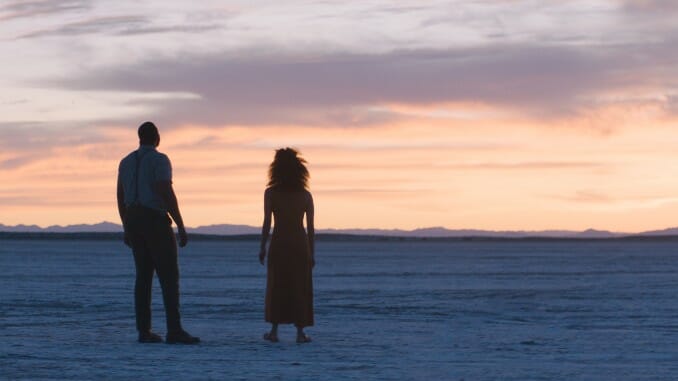The Heartfelt and Elegant Nine Days Is One of the Year’s Best Debuts

In a small house, alone in the desert, Will (Winston Duke) watches. Nine Days, the wrenching feature debut from writer/director Edson Oda, understands that we are an existence of voyeurism. We’re only truly living to our fullest when we can see, share, feel the experiences of others. Will is a sort of hiring manager for life itself. As painful as it is for him to accept (he’s obviously grown fond of his previous picks), there is a new vacancy, and there are a few candidates. Over a nine-day process, almost like an audition for a reality show—especially fitting considering that the plane they would leave behind houses a watcher carefully and compassionately taking in a televised wall of literal life-streams—Will and his friend/co-worker Kyo (Benedict Wong) whittle down the applicants to find the best person suited for the gift of worldly existence. Oda’s compact, stirring, metaphysical sci-fi stageplay about the ends and beginnings of life—and all the wonder ripe for the sharing contained between—is as moving a debut as you’ll see all year.
First, it takes some real creative brass to try to tackle such an ambitious, heady and easily trite topic. Second, it takes some major storytelling talent—both in the crafting of the script and the handling of its actors—to overcome those obstacles while keeping the dignity of all involved intact. Nine Days has quiet confidence, written in the way that some of the best sci-fi is, where it feels like a massive text that’s been erased down to the barest elements necessary for a perception imagination to piece together—a painting of overwhelming sentiment depicted with the simplest strokes possible. Oda’s script has been visualized with a similar restraint, nearly contained to Will’s home and its screens before it slowly pushes at these boundaries.
But, at first at least, Will’s hopefuls—including Tony Hale, Bill Skarsgård, David Rysdahl, Arianna Ortiz and a last-minute Zazie Beetz—are roped into routine. They start off as one-note ideas, some developing with nuance and others simply doubling down on their single traits: Laid-back humor, justice, curiosity. They’re like newborn characters trying to find their way out of a writer, souls striving for more than a core. Some make it further in the process; some are too boxed in by the strong singularity of their initial personalities.
With its single location and genre conceit, Nine Days could’ve easily felt like a closed-off and small series of acting exercises or thought experiments. The brief moments it strays into this territory are when we come to terms with Beetz’ character, who’s far more insightful compared to the rest of the new souls—though she sells the precociousness with aplomb. The script sometimes threatens to openly devolve into an ideological contest rather than a conversation, but the commitment of its underplaying cast—their interviews and tests woven together by editors Jeff Betancourt and Michael Taylor with a smoothness that propels us along the process—and the restraint of its script keeps its no-larger-than-life ideas from collapsing under their own weight.
Complicating these applications is Will’s personal connection to the person who left the vacancy behind in the first place. Will isn’t just watching the progress of his hires, but watching his children grow up from birth. A favorite is a violinist, with whom he hums along and takes special observational care; she’s the one whose death sets things in motion, and she hangs over Will throughout. It adds depth and shadow to Will’s otherwise strict and arms-length entity, enabling a greater empathy for the character and a greater performance from Duke. While Wong is honest and unfettered, Duke is a wall of corporate disaffection, with a capacity for love powerful enough to peek past his professional façade until it finally topples it over completely. The watchers and their workplace are decked in drab, olives and khakis, compared to the cool, low-fi phosphorescent glow of the countless TVs. It’s a palette of defensive, constructed apathy constantly colored in by the seductive emotions flashing by on the screens’ lives.
-

-

-

-

-

-

-

-

-

-

-

-

-

-

-

-

-

-

-

-

-

-

-

-

-

-

-

-

-

-

-

-

-

-

-

-

-

-

-

-








































